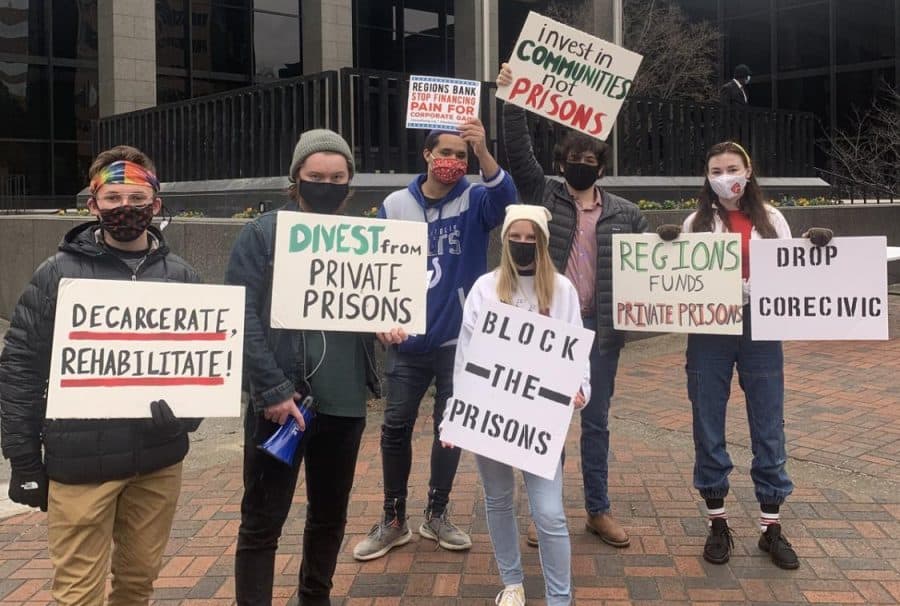Alabama students protest Ivey’s private prison plan
In the middle of a pandemic, Alabama is building three private prisons. Some college students are saying that’s three too many.
Alabama Students Against Prisons (ASAP), a coalition of university students from across the state, protested Regions Bank’s funding of two new private prisons. The group of about 30 protesters gathered outside the bank’s downtown Birmingham location on Monday evening.
On Sept. 3, Alabama Governor Kay Ivey approved the construction of three new private mega-prisons in the state, which will be located in Bibb County, Escambia County and Elmore County. The Bibb County facility’s proposed site is about 30 minutes from The University of Alabama’s campus. There are currently 27 state correctional facilities in Alabama.
Construction is expected to begin on Jan. 15.
Each of the prisons will house more than 3,000 inmates and, according to Ivey, will provide “necessary improvements” to Alabama’s prison infrastructure. This will make these three mega-prisons double the size of the largest correctional facility in Alabama right now.
“Given the failing state of the [Alabama Department of Corrections’] existing infrastructure and that the Department already is faced with more than $1 billion in deferred maintenance costs alone, pursuing new construction without raising taxes or incurring debt is the fiscally sound and responsible decision,” Ivey said.
She said the plan will create thousands of construction jobs and a “safer environment” for both correctional officers and inmates.
Last year’s homicide rate in Alabama prisons was 76 per 100,000 inmates, more than nine times the national rate. Rates of stabbings and sexual violence were also unparalleled elsewhere in the United States. The move also takes place during a pandemic that has killed nearly 2,000 inmates nationwide, including at least 50 in Alabama state prisons.
The state will fund the $2.7 billion construction of the three facilities through a 30-year lease with the two companies building the prisons: CoreCivic and Alabama Prison Transformation Partners (APTP).
The Alabama Prison Transformation Partners are comprised of two different companies: Star America and BL Harbert, who are “co-team leaders” for other construction companies.
CoreCivic will break ground for the first time in Alabama with a prison in Elmore County and Escambia County. Prior to 2016, the company was known as the Corrections Corporation of America but rebranded after a slew of bad press surrounding its Tennessee facilities.
Hannah Krawczyk, a senior at Auburn University and leader of ASAP, said the organization was targeting Regions Bank for “funding a company that commits human rights abuses.” At CoreCivic facilities, seven prisoners filed sexual abuse and harassment reports that were either ignored or mishandled.
CoreCivic has been losing funding for its 119 facilities nationwide, and Regions Bank is one of few willing to finance the company’s endeavor.
Regions Bank has not given a public statement on the funding of CoreCivic.
David Zell, a junior at the University and leader of ASAP, said he believes the overpopulation of prisons is not the problem the state should be concerned with. The state’s focus, he said, should be changing laws and rehabilitating the incarcerated.
“Alabama is not in this position because we don’t have enough prisons,” Zell said. “We are in this position because we have too many prisoners.”











